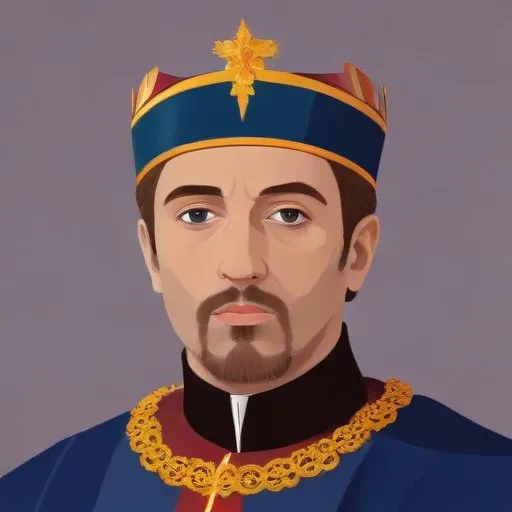
King of Naples from 1494 to 1495, known for his brief but tumultuous reign marked by wars and power struggles.
Alfonso II of Naples, also known as Alfonso of Calabria, was a 15th-century Italian monarch who reigned as King of Naples from 1494 to 1495. He is renowned for his patronage of Renaissance architecture and the arts, as well as his military prowess, which earned him the title of Duke of Calabria.
Alfonso's military campaigns were marked by significant victories, including the successful defense of Otranto against the Ottoman invasion in 1480-1481 and the war against the Republic of Venice in 1484. His military prowess was matched by his cultural achievements, as he commissioned several architectural projects in Naples, including the construction of new churches, straightened roads, and an aqueduct that supplied fountains throughout the city.
Under Alfonso's patronage, Naples underwent significant transformations, becoming a hub of Renaissance architecture and urban planning. The city's infrastructure was redesigned, with new streets and public spaces created to accommodate the growing population. Alfonso's passion for architecture led to the construction of magnificent buildings, such as the Castel Nuovo, which became a symbol of Naples' cultural and artistic heritage.
Alfonso's reign was marked by controversy, as he faced opposition from the Neapolitan nobility, who resented his repressive policies. In 1486, a revolt broke out, which Alfonso brutally suppressed, further eroding his popularity. The final blow came when Charles VIII of France invaded Naples in 1495, forcing Alfonso to abdicate the throne in favor of his son, Ferdinand II.
After his abdication, Alfonso retreated to an Olivetan monastery in Mazara del Vallo, Sicily, where he spent the remainder of his life. Despite his tumultuous reign, Alfonso's legacy as a patron of the arts and a military leader has endured, earning him a place in the annals of Italian history.
Alfonso was born in Naples in 1448, the eldest son of Ferdinand I of Naples and Isabella of Clermont. He received a humanist education at his father's court, where he was tutored by the renowned humanist Giovanni Pontano. Pontano dedicated two treatises to Alfonso, De principe and De fortitudine, which reflected the young prince's virtues and manner of life.
Alfonso succeeded his father as King of Naples in 1494, but his reign was short-lived. He was succeeded by his son, Ferdinand II, who went on to become King of Naples. Alfonso's family ties were also marked by his inheritance of the title of King of Jerusalem, which he acquired through his maternal great-uncle, Giovanni Antonio del Balzo Orsini, Prince of Taranto.
Alfonso II of Naples left an indelible mark on the city of Naples, transforming it into a hub of Renaissance culture and architecture. His military campaigns and diplomatic initiatives also contributed to the preservation of Naples' independence and cultural heritage. Despite the controversies surrounding his reign, Alfonso's legacy as a patron of the arts and a military leader has endured, making him a significant figure in Italian history.

Born in 1423
King of Naples who ruled from 1458 to 1494, known for his military campaigns and cultural achievements, including patronizing artists and writers.
Born in 1350
King of Aragon from 1387 to 1396, known for his tumultuous reign marked by conflicts with the nobility and the papacy. He was also a patron of the arts and literature.
Born in 1380
Unified the Crown of Aragon, ruling over a vast territory in eastern Spain, and sponsored the voyages of Christopher Columbus, leading to the discovery of the New World.
Born in 1451
Unified the Spanish kingdoms, sponsored Christopher Columbus's voyage to the Americas, and established the Spanish Inquisition.
Born in 1423
King of Naples who ruled from 1458 to 1494, known for his military campaigns and cultural achievements, including patronizing artists and writers.
Born in 1403
King of France from 1422 to 1461, he played a crucial role in ending the Hundred Years' War by expelling the English from French territory. He also established a strong centralized government.
Born in 1785
The last king of the French monarchy before the French Revolution, known for his tragic and mysterious life, including his imprisonment and disputed death.